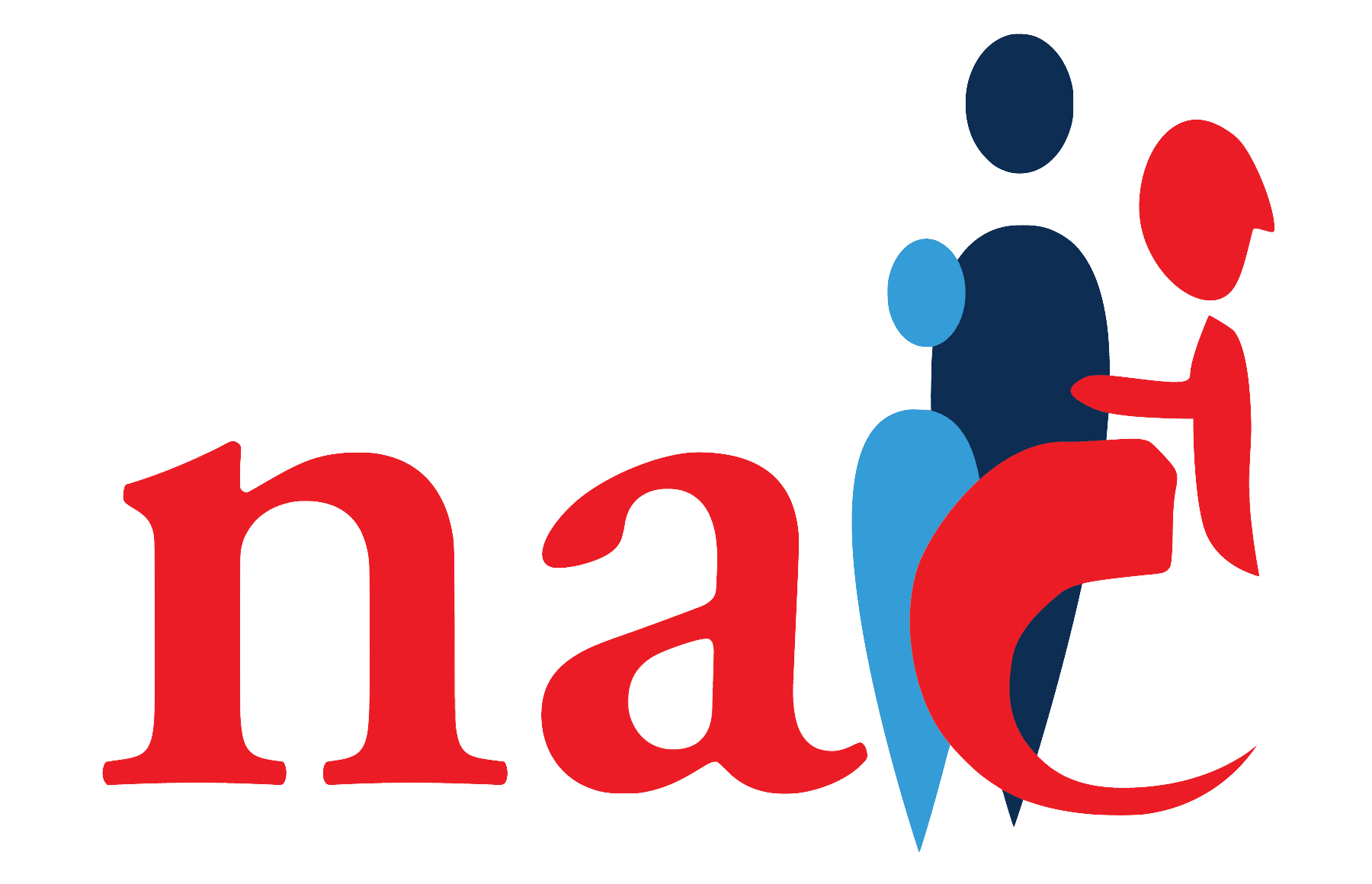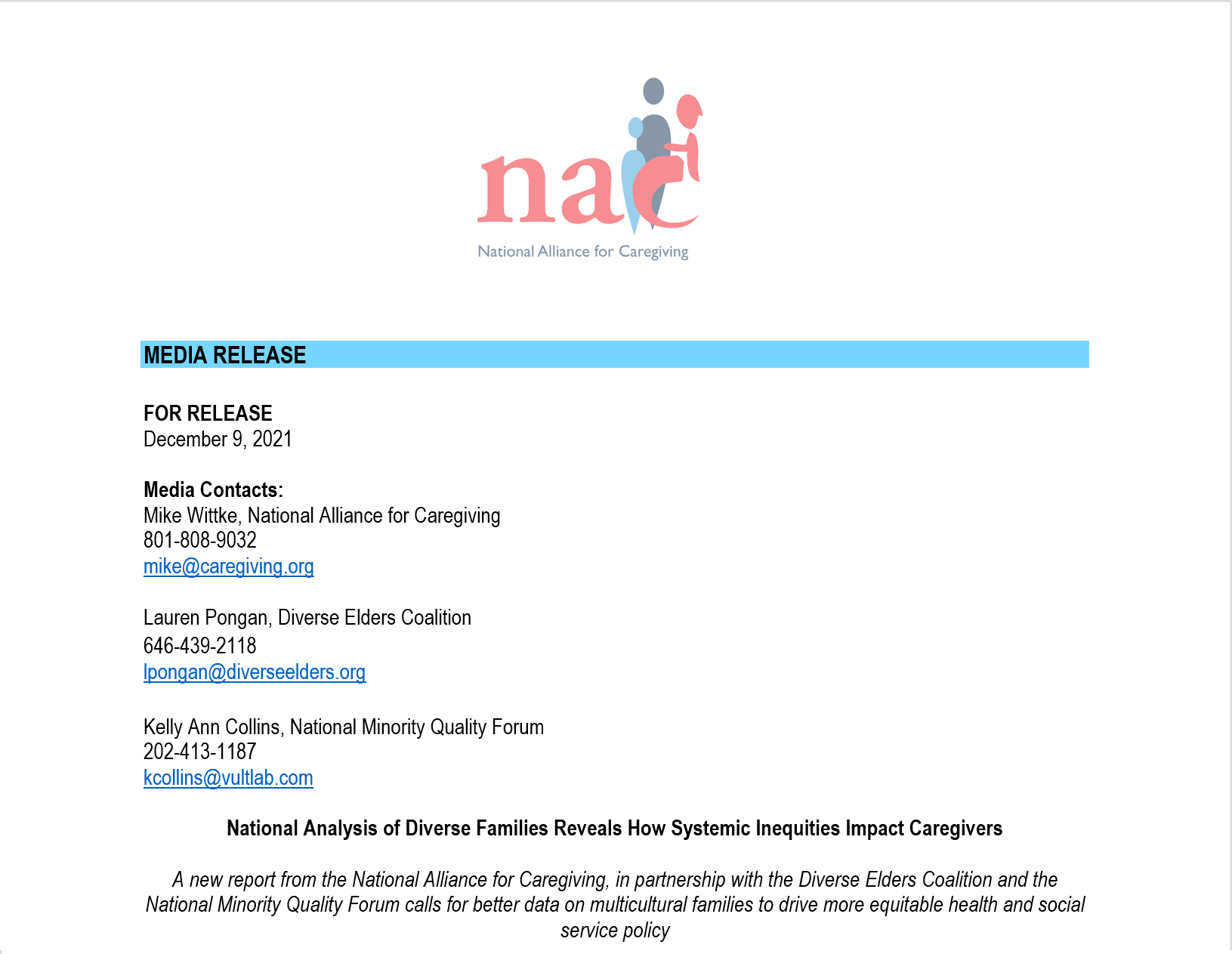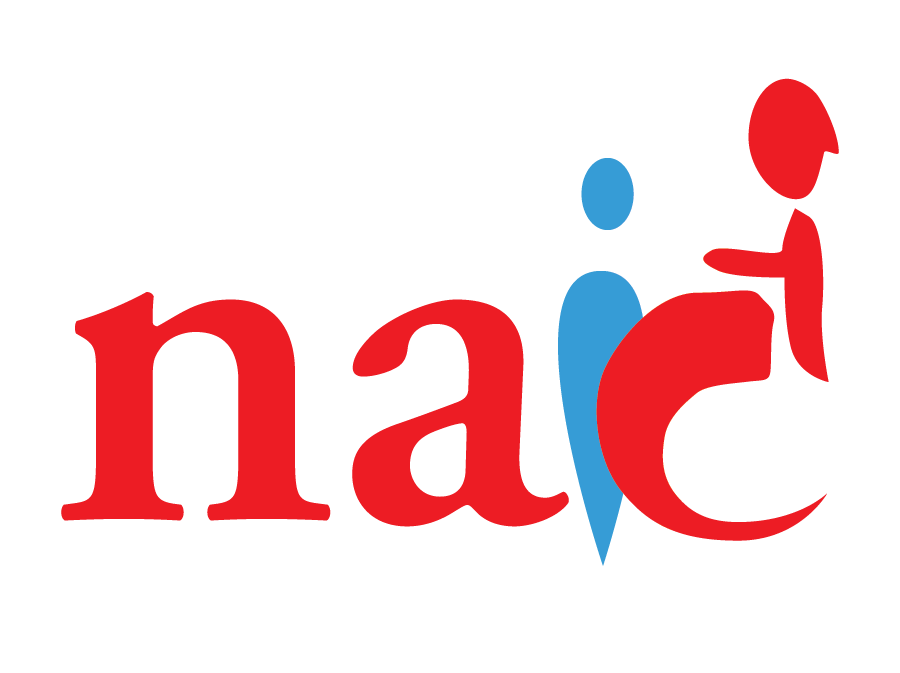Washington D.C. – December 9, 2021 – A new national report from the National Alliance for Caregiving (NAC), created in partnership with the Diverse Elders Coalition and the National Minority Quality Forum, offers findings on multicultural family caregivers that may provide insights into ongoing national debates on health equity. Of the estimated 53 million caregivers in the United States, 17 percent are Hispanic, 14 percent are African American, and 5 percent are Asian American and Pacific Islanders (AAPI). Together, non-White populations represent nearly 40% of America’s family caregivers.
“America is a richly diverse nation and family caregivers reflect that diversity,” said Michael R. Wittke, Vice President for Research and Advocacy at the National Alliance for Caregiving. “We feel it’s important to share these new insights on family caregivers from diverse populations, highlighting systemic inequities and recognizing that our research and data sets need more granularity to capture the broad range of experiences that reflect the experiences of caregivers from underrepresented communities.”
Caregiving in a Diverse America: Beginning to Understand the Systemic Challenges Facing Family Caregivers includes a multivariate analysis of the AARP/NAC Caregiving in the U.S. 2020 data set, one of few statistically representative data sets of family caregivers available nationally. The report analyzes more than 800 caregiver respondents, capturing perspectives from African American, Hispanic, and AAPI individuals. Analysis of the caregiving experience by socioeconomic background, sexual orientation, and gender is also included in the study.
The report was produced via a partnership between the National Alliance for Caregiving with the Diverse Elders Coalition and the National Minority Quality Forum and made possible through support from Amgen. The multivariate analysis was conducted by researchers at Dartmouth College. The report also includes additional literature on diverse caregiving and research recommendations, and was reviewed by an Advisory Committee which included subject-matter experts and people with lived experience.
“This report marks an important first step in better understanding the unique challenges of caregivers,” said Judy Brown, senior vice president of Corporate Affairs at Amgen. “The findings make it clear that addressing the needs of caregivers is a critical part of achieving a future in which all Americans are able to receive equitable healthcare regardless of race, ethnicity or socioeconomic status.”
“In this report, we see that diverse family caregivers report strengths and protective factors, like feeling fulfillment and meaning through caregiving. But we also see that decline in self-reported health, and barriers to accessing resources and services.” said Lauren Pongan, National Director of the Diverse Elders Coalition. “We need more research to learn about the experiences of American Indian/Alaska Native, AAPI, and LGBTQ+ caregivers, and to learn how we can better support all family caregivers in their roles and as individuals.
“The National Minority Quality Forum is pleased to partner with the Diverse Elders Coalition and the National Alliance for Caregiving in addressing the caregiving needs of the American general population as it blossoms through the concurrency of maturation and cultural diversification. This report is an important step in our shared journey toward that future,” stated Gretchen C. Wartman, the NMQF Vice President for Policy and Program and Director of their Institute for Equity in Health Policy and Practice.
Highlights: African American Caregivers
The 2020 data revealed that many African American families felt more engaged in shared-decision making with the people they were caring for:
- Six out of 10 reported advocating for the person in their care (62% up from 47%)
- Most helped to monitor the condition of the person who needed care (74% up from 62%)
- More than half reported advocating for the person in their care (62% up from 47%).
Yet despite this higher engagement, African American caregivers in 2020 were more likely to rate their health as “fair/poor” compared to five years ago. Many African American families were more likely to report negative financial impacts due to care, such as leaving bills unpaid or putting a halt to their saving. While nearly 60% reported that being a caregiver gave them a sense of “meaning” in their life – higher than caregivers from other backgrounds – many families were less likely to get help they needed. African American caregivers were less likely to receive respite, a critical need especially for families who live in the same household as the person who needs care.
Highlights: Hispanic Caregivers
Hispanic caregivers tended to have less access to help – either paid or unpaid – and were more likely to experience high care intensity levels when compared to Non-Hispanic White caregivers. Like African American families, Hispanic caregivers reported a decline in their self-reported health, with only 35% reporting “excellent/very good” health compared to 51% in 2015. While more than half of Hispanic caregivers reported that being a caregiver gives them meaning or purpose, many also reported that they were less likely to be able to pay bills, save, or afford basic expenses like food. One out of ten reported that they had to move to a less expensive home, apartment, or other living arrangement because of the costs of care. And just over 20% of Hispanic caregivers reported that they had no access to health insurance for themselves.
Additional Populations Covered
The report also includes information about Asian American and Pacific Islanders, one of the fastest growing ethnic groups in the United States. Like other non-white caregivers, AAPI caregivers self-reported worse health than when last surveyed five years ago. Many AAPI caregivers encountered barriers in care delivery as well. While these families were less likely to receive information from medical care providers, they were more likely to want help from medical providers on supporting the person who needs care.
While the data is not as expansive, the report also includes findings about the LGBTQ+ (lesbian, gay, bisexual, transgender, queer/questioning) caregiving community. LGBTQ+ caregivers were more likely to report that they were the primary caregiver and that they had difficulty managing care coordination across multiple care providers.
Recommendations
The data analysis highlights some general themes that can meaningfully improve the caregiver experience for diverse populations:
- Acknowledging, incorporating, and continually improving cultural literacy into the development of programs, resources, and services designed for caregivers of diverse racial and ethnic backgrounds.
- Ensuring that the eligibility criteria for programs and services designed for caregivers offer an inclusive definition of “family”—to include siblings, aunts, uncles, cousins, nieces, nephews, grandparents, grandchildren, and domestic partners.
- Recognizing and increasing access to caregiver programs, resources, services, and support networks that are designed to go beyond traditional notions of the family structure and are inclusive of the LGBTQ+ community.
- Facilitating better access to programs, services, and resources to caregivers in rural areas and where access to technology is less readily available or counter-productive to the needs of the caregiver or person receiving care.
Recommendations for academic and research institutions likewise identify how researchers could address issues related to inequity:
- Invest in caregiver research and data collection.
- Address the lack of American Indian/Alaska Native representation in research.
- Address the lack of intersectionality and segmentation in research.
###
Get the Report
To read our report and findings on diverse family caregivers in the United States, visit https://www.caregiving.org/wp-content/uploads/2021/11/NAC_AmgenDiverseCaregiversReport_FinalDigital-111821.pdf.
About This Report
In the analysis and development of this research report, the National Alliance for Caregiving enlisted the expertise of an advisory committee and expert reviewers in the caregiving space, including advocates, researchers and those committed to equity in the health care system, including: Alyssa Smolen, BS; Lisa Weber-Riley, MA; Feylyn Lewis, PhD; Gabriela Prudencio, MBA; Karen L. Marshall, JD; Charlotte Davidson; Rita B. Choula, MA; Yanira Cruz, MPH, DrPH; J. Nicholas Dionne-Odom, PhD, RN, ACHPN, FPCN; Eboni Green, PhD, RN; Tamryn F. Gray, PhD, RN, MPH; Tim R. Johnston, PhD; Ocean Le, BSBA, MS; Sandy Magaña, PhD, MSW; Jared Make; Lauren Pongan, MA; Regina, A. Shih, PhD; Jahdziah O. St. Julien; and Gretchen C. Wartman. This report was written by: Mousumi Bose, PhD; Lauren Tokarewich, MLIS: Reed W.R. Bratches, MPH, PhD Candidate: and Paul J. Barr, PhD MSc. The report was made possible through grant funding from Amgen, Inc., and the Diverse Elders Coalition.
About the National Alliance for Caregiving
NAC’s mission is to build partnerships in research, advocacy, and innovation to make life better for family caregivers. Our work aims to support a society which values, supports, and empowers family caregivers to thrive at home, work, and life. As a 501(c)(3) charitable non-profit organization based in Washington, D.C., we represent a coalition of more than 60 non-profit, corporate, and academic organizations; nearly 40 family support researchers with expertise in pediatric to adult care to geriatric care; and more than 50 advocates who work on national, state, and local platforms to support caregivers across the United States. In addition to our national work, NAC leads and participates in several global meetings on caregiving and long-term care, working closely with peer organizations in countries such as Australia, Canada, Denmark, Finland, France, Hong Kong, India and Nepal, Ireland, Israel, Japan, New Zealand, Sweden, Taiwan, and the United Kingdom.
About the Diverse Elders Coalition
The Diverse Elders Coalition (DEC) advocates for policies and programs that improve aging in our communities as racially and ethnically diverse people; American Indians and Alaska Natives; and lesbian, gay, bisexual and/or transgender people. We envision a world where all older adults can live full and active lives as they age.
Together, we are made up of six national organizations representing a growing majority of millions of older people throughout the country:
- National Asian Pacific Center on Aging
- National Caucus and Center on Black Aging
- National Hispanic Council on Aging
- National Indian Council on Aging
- SAGE
- Southeast Asia Resource Action Center
About the National Minority Quality Forum
The National Minority Quality Forum (NMQF) is a 501(c)(3) not-for-profit research and advocacy organization based in Washington, DC. The mission of NMQF is to reduce patient risk by assuring optimal care for all. NMQF’s vision is an American health services research, delivery and financing system whose operating principle is to reduce patient risk for amenable morbidity and mortality while improving quality of life.


